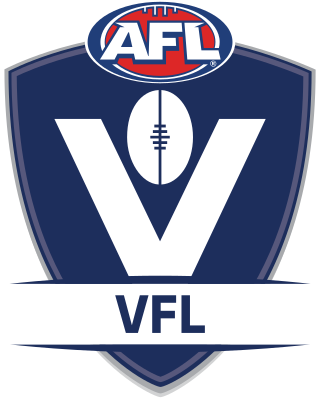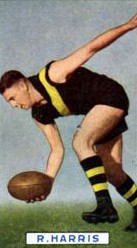
The Victorian Football League (VFL) is an Australian rules football competition in Australia operated by the Australian Football League (AFL) as a second-tier, regional, semi-professional competition. It includes teams from clubs based in eastern states of Australia: Victoria, New South Wales and Queensland, including reserves teams for the eastern state AFL clubs. It succeeded and continues the competition of the former Victorian Football Association (VFA) which began in 1877. The name of the competition was changed to the Victorian Football League in 1996. Under its VFL brand, the AFL also operates a women's football competition known as VFL Women's, which was established in 2016.

The Williamstown Football Club, nicknamed the Seagulls, is an Australian rules football club based in Melbourne. The club currently competes in the men's Victorian Football League and VFL Women's competitions.

Albert John Thurgood was an Australian rules footballer in the Victorian Football Association (VFA), Victorian Football League (VFL) and the Western Australian Football Association (WAFA).

Richard Dennis Harris was an Australian rules footballer who played in the Victorian Football League (VFL) between 1934 and 1944 for the Richmond Football Club. Harris played mainly as a rover and was highly successful in front of goals. He also represented Victoria at interstate football, playing a total of nine games for his state including the 1937 Perth Carnival.
Harold Peter "Hassa" Mann is a former Australian rules footballer who played for and captained Melbourne in the VFL during the 1960s. He earned the name Hassa when he was a toddler, from his cousin and future Melbourne footballer Len Mann.
The 2006 Victorian Football League (VFL) is a semi-professional Australian Rules Football competition featuring 12 teams from Victoria and one team from Tasmania.
Stuart Nicol is a former Australian rules footballer who played for Footscray in the Victorian Football League (VFL) during the late 1980s.
Mitchell Banner is a former professional Australian rules footballer who played for the Port Adelaide Football Club in the Australian Football League (AFL).
Peter Faullks is an Australian rules footballer for the Fremantle Football Club in the Australian Football League (AFL) and the Peel Thunder Football Club in the West Australian Football League (WAFL).
The 2013 Victorian Football League season was the 132nd season of the Victorian Football Association/Victorian Football League Australian rules football competition. The premiership was won by Box Hill who defeated Geelong by 21 points in the Grand Final.

The 1949 Victorian Football Association season was the 68th season of the Australian rules football competition. The premiership was won by the Williamstown Football Club, which defeated Oakleigh by three points in the Grand Final on 1 October. It was the fifth premiership won by the club.
The 1986 Victorian Football Association season was the 105th season of the top division of the Australian rules football competition, and the 26th season of second division competition. The Division 1 premiership was won by the Williamstown Football Club, after it defeated Coburg in the Grand Final on 21 September by 13 points; it was Williamstown's eleventh Division 1 premiership, and its first since 1959. The Division 2 premiership was won by Box Hill; it was the club's second Division 2 premiership in three years, having competed in and been relegated from Division 1 in the intervening year.
The 1988 Victorian Football Association season was the 107th season of the top division of the Australian rules football competition, and the 28th and final season of second division competition. The Division 1 premiership was won by the Coburg Football Club, after it defeated Williamstown in the Grand Final on 18 September by 27 points; it was Coburg's fifth Division 1 premiership. The final Division 2 premiership was won by Oakleigh; it was the club's second Division 2 premiership, and the last premiership ever won by the club in either division.
Bill Swan is a former Australian rules footballer who was a star of the Victorian Football Association (VFA) during the 1980s over an eighteen-year senior career with the Port Melbourne and Williamstown Football Clubs.
The 1990 Victorian Football Association season was the 109th season of the Australian rules football competition. The premiership was won by the Williamstown Football Club, after it defeated Springvale in the grand final on 30 September by two points; it was Williamstown's twelfth top-division premiership.
The 1992 Victorian Football Association season was the 111th season of the Australian rules football competition. The premiership was won by the Sandringham Football Club, after it defeated Williamstown in the grand final on 20 September by 44 points; it was Sandringham's fourth top-division premiership.
The 1993 Victorian Football Association season was the 112th season of the Australian rules football competition. The premiership was won by the Werribee Football Club, after it defeated Port Melbourne in the grand final on 19 September by 42 points; it was the first and, as of 2018, only premiership won by the club in either division.
The 1995 Victorian Football Association season was the 114th overall season of the Australian rules football competition. The premiership was won by the Springvale Football Club, after it defeated Sandringham in the grand final on 24 September by 43 points; it was the second premiership won by the club.
The 2001 Victorian Football League season was the 120th season of the Australian rules football competition.
Stanley Merton Lawler was an Australian rules footballer who played with South Melbourne and Essendon in the Victorian Football League (VFL).






